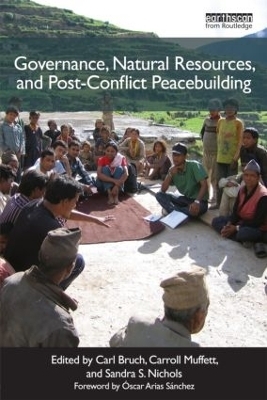
Governance, Natural Resources and Post-Conflict Peacebuilding
Earthscan Ltd (Verlag)
978-1-84971-235-4 (ISBN)
When the guns are silenced, those who have survived armed conflict need food, water, shelter, the means to earn a living, and the promise of safety and a return to civil order. Meeting these needs while sustaining peace requires more than simply having governmental structures in place; it requires good governance.
Natural resources are essential to sustaining people and peace in post-conflict countries, but governance failures often jeopardize such efforts. This book examines the theory, practice, and often surprising realities of post-conflict governance, natural resource management, and peacebuilding in fifty conflict-affected countries and territories. It includes thirty-nine chapters written by more than seventy researchers, diplomats, military personnel, and practitioners from governmental, intergovernmental, and nongovernmental organizations.
The book highlights the mutually reinforcing relationship between natural resource management and good governance. Natural resource management is crucial to rebuilding governance and the rule of law, combating corruption, improving transparency and accountability, engaging disenfranchised populations, and building confidence after conflict. At the same time, good governance is essential for ensuring that natural resource management can meet immediate needs for post-conflict stability and development, while simultaneously laying the foundation for a sustainable peace. Drawing on analyses of the close relationship between governance and natural resource management, the book explores lessons from past conflicts and ongoing reconstruction efforts; illustrates how those lessons may be applied to the formulation and implementation of more effective governance initiatives; and presents an emerging theoretical and practical framework for policy makers, researchers, practitioners, and students.
Governance, Natural Resources, and Post-Conflict Peacebuilding is part of a global initiative to identify and analyze lessons in post-conflict peacebuilding and natural resource management. The project has generated six books of case studies and analyses, with contributions from practitioners, policy makers, and researchers. Other books in this series address high-value resources, land, water, livelihoods, and assessing and restoring natural resources.
Carl Bruch is director of International Programs at the Environmental Law Institute. Carroll Muffett is president of the Center for International Environmental Law. Sandra S. Nichols is an environmental and natural resources attorney who works to improve governance and accountability, and protect community rights in natural resource–based economic activities.
Part 1: Introduction – Humility in the Face of Complexity Introduction. The Role of Natural Resource Management in Reducing the Risk of Conflict Recurrence. Part 2: Awareness – Assessment and Evaluation Introduction. How the Use of Economic Analysis of Environmental Degradation. Can Influence Policy Processes: Experience from Rwanda. Thinking Back-End: Improving Post-Conflict Analysis by Emphasizing Consultation and Scenario Development. Evaluating the Contribution of External Support in Post-Conflict Situations: From Early Recovery to Sustainable Development Part 3: Governance Interventions Introduction. Good Governance - Introduction. The Role of Environmental Law in Post-Conflict Peacebuilding. Natural Resources, Corruption, and Post-Conflict Transitions. Stopping the Plundering of Natural Resources for Sustainable Peace in Côte d'Ivoire. Sartor Resartus: Reviewing Concession Reviews – Recent Liberian Experience and the Prospects for Effective Internationalized Solutions. Early Action Fund for Resolving Local Disputes over Natural Resources. Institutions-Introduction. Environmental Experiences and Developments within UN Department of Field Support and Department of Peacekeeping Operations. Bumps in the Road toward Effective Peacekeeping: Lessons from Sierra Leone and Democratic Republic of Congo. Reducing the Environmental Boot Print of the Military in Peace Operations. Military - military Engagement on Environment and Natural Disasters: Lessons Learned for Post-Conflict Peacebuilding. Review of UNEP Post-Conflict Assessment Experiences. UN Peacebuilding Commission. Taking the Gun out of Natural Resource Exploitation. Mitigating Natural Resource Conflicts through Development Projects: Some Lessons from World Bank Experience. Non-Governmental and Local Institutions. Introduction - Natural Resources and Peacebuilding: The Role of the Private Sector. Legal Pluralism in the Post Conflict Environment: Problem or Opportunity for Natural Resource Management? The Role of Conservation in Promoting Sustainability and Security in at-risk Communities. Marginalized Populations. Introduction - Strengthening Post-Conflict Peacebuilding through Natural Resource Management – A Gender Perspective. Indigenous Peoples, Natural Resources, and Peacebuilding in Colombia Part 4: Cross-Cutting Issues Introduction. Before the Peace/Preparing for Peace. Preparing for Peace – A Case Study of Darfur, Sudan. Stepping Stones to Peace? Natural Resource Provisions in Peace Agreements. Challenges of Snow Leopard Diplomacy: The Pamirs Transboundary Peace Park. Considerations on When to Include Natural Resources in Peace Agreements. Situating NRM within other Post-Conflict Priorities. 'Green' Peace in Aceh?: Consolidating Peace through the 'Aceh Green' Strategy. Environment and NRM: Interweaving Post-Conflict Humanitarian and Development Response. Conservation as Democracy in Afghanistan. Transition, Justice, and Accountability. Building Momentum and Constituencies for Peace: The Role of Natural Resources in Transitional Justice and Peacebuilding. Peace through Justice?: International Tribunals and Accountability for Wartime Environmental Damage. The United Nations Compensation Commission and the 1990-1991 Gulf War: The Role of Natural Resources in International Reconciliation (Iraq/Kuwait). Some Reflections on the UNCC Experience. Confidence Building through NRM. Paving the Way: The Role of the Central American Commission for Environment and Development (CCAD) in Post-Conflict Peacebuilding through Environmental Governance. Perú and Ecuador 'Peace Parks': A Decade after the Peace Settlement Part 5: Emerging Issues and Conclusions Climate Change and Post-Conflict Peacebuilding Strengthening. Post-Conflict Governance and Rule of Law through Natural Resource Management. Appendices
| Reihe/Serie | Post-Conflict Peacebuilding and Natural Resource Management |
|---|---|
| Verlagsort | London |
| Sprache | englisch |
| Maße | 152 x 229 mm |
| Gewicht | 1519 g |
| Themenwelt | Naturwissenschaften ► Biologie ► Ökologie / Naturschutz |
| Recht / Steuern ► Allgemeines / Lexika | |
| Recht / Steuern ► EU / Internationales Recht | |
| Sozialwissenschaften ► Politik / Verwaltung ► Europäische / Internationale Politik | |
| Sozialwissenschaften ► Soziologie ► Spezielle Soziologien | |
| Technik ► Umwelttechnik / Biotechnologie | |
| ISBN-10 | 1-84971-235-2 / 1849712352 |
| ISBN-13 | 978-1-84971-235-4 / 9781849712354 |
| Zustand | Neuware |
| Haben Sie eine Frage zum Produkt? |
aus dem Bereich


